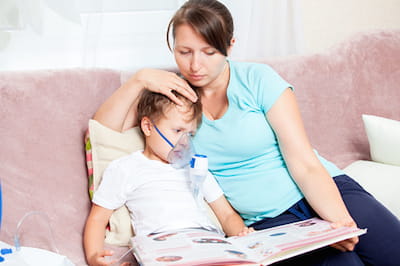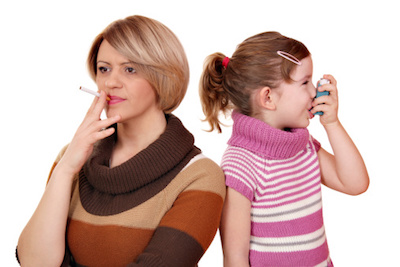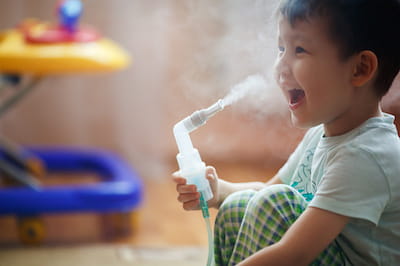So your child has asthma, now what?
Asthma is a somewhat common childhood illness that affects nearly 1 in 10 children, according to the Centers for Disease Control and Prevention (CDC). It is a condition that affects the airway of the lungs, making it difficult for your child to breathe when they are having an “attack.” Asthma can look very different from child to child, with some children showing daily symptoms and others only with vigorous exercise. The most important aspect of dealing with your child’s asthma is control and prevention.
What causes an asthma attack?
A child with asthma may be completely fine one moment, then show signs of an asthma attack moments later. Typical signs may include cough, wheezing, and breathing faster than normal. If your child is old enough, they may express feelings of chest tightness, pain, or a sense of panic. Sometimes these symptoms can gradually occur, but other times they may come on in a matter of minutes. Typically, attacks are “triggered” by certain events or exposures.

The most common causes are listed below:
-Environmental triggers:
These include substances in the environment that your child may be sensitive to- cigarette smoke, dust mites, cat or dog hair, certain grasses/trees/pollens/weeds, and colognes or fragrances are among the most common.
-Illnesses:
You may notice that if your child gets sick with an illness such as the common cold, he may also develop an asthma attack. Typically this process is more gradual, with cough, congestion, runny nose, and possible fever developing before he starts having trouble breathing.
-Exercise:
You may find that your child is not able to exercise without stopping as much as other children. It may be playing sports or simply running around during recess or gym that can cause an attack.
-Weather:
Some children have more attacks during certain seasons of the year, or during the times of weather change. For instance, if it has been a very warm week that suddenly transitions into a cold weekend, the change in atmosphere may cause an attack.
How to treat an asthma attack
The best way to treat a child with asthma is to prevent the symptoms from happening. Some asthma attacks cannot be stopped, and will occur no matter what the child has been doing. However, some attacks can be prevented, which is the best way to treat asthma.
Identify and avoid triggers.

Try to determine what your child’s “triggers” are by noting where you were and what they were doing whenever he started coughing or having trouble breathing. Once a trigger is identified, determine how the trigger can be avoided so that it will not cause another asthma attack. For instance, if your child always starts coughing when he plays with the neighbor’s cat, an attack can be prevented by avoiding cats.
- Some triggers are known to affect all children with asthma, the most common being cigarette smoke. Try to avoid smoke exposure as much as possible. If someone who lives in the house with your child smokes, encourage them to stop smoking and to seek medical advice in quitting. While instructing them to smoke outside is better than allowing them to smoke inside, the chemicals and toxins that trigger your child’s asthma attack are still found inside the home. The best solution for the asthmatic child is to not be around anyone that smokes.
- Allergens: As mentioned above, some common triggers are things that your child might be allergic to such as cats, dogs, dust mites, molds, grass, trees, and other substances in the environment. You may notice that they develop a runny nose or itchy eyes when around certain things. Once identified, attempt to prevent your child from coming into contact with something he may be allergic to. You doctor may consider allergy testing if you find that your child has a lot asthma attacks from these triggers.
Utilize your child’s medication as prescribed.
Most importantly, your doctor will determine how severe your child’s asthma is and place them on the appropriate medications. Be sure to follow the specific instructions that your doctor has given to you.

- The most common medication is what is called the “rescue inhaler.” This medication is called Albuterol and may be prescribed under names such as Proventil, AccuNeb, or Ventolin. This medication should be taken at the first sign that your child may be having an asthma attack. If they tell you that they are having trouble breathing or their chest feels tight, this medication should be given immediately. If you notice that they are breathing faster than normal or wheezing, this medication should be given. Be sure to take this medication as prescribed by your physician. If symptoms worsen or do not improve with the rescue medication, seek advice from your pediatrician or go to the emergency room. In order to be able to use this medication, it is important that your child always has access to it, wherever they may go during the day.
- There are other daily medications that your child may or may not need, depending on their asthma severity as determined by your doctor. There are other types of inhalers that are not rescue inhalers and if prescribed, should be taken on a daily basis as instructed by your pediatrician. If your child takes medications every day, make sure that they take them daily and that medicines are not forgotten. Even if your child does not have any symptoms, missing a medication that is supposed to be taken daily can cause asthma attacks.
Create an action plan.
An action plan is very important to appropriately prevent and treat your child’s asthma attacks. This is a plan that has been discussed with your pediatrician, outlining what your child should be doing on a daily basis, as well as steps to take should your child begin developing symptoms of an asthma attack. It is very important that people involved in your child’s care have a copy of this plan including parents, grandparents, daycare center, or school nurse.
Quick Scheduling with a Pediatric Pulmonary or Sleep Medicine Specialist
Enjoy comprehensive service and award-winning healthcare. Submit an appointment request today, and our staff will follow up with you shortly to confirm a time that works for you and your family.






